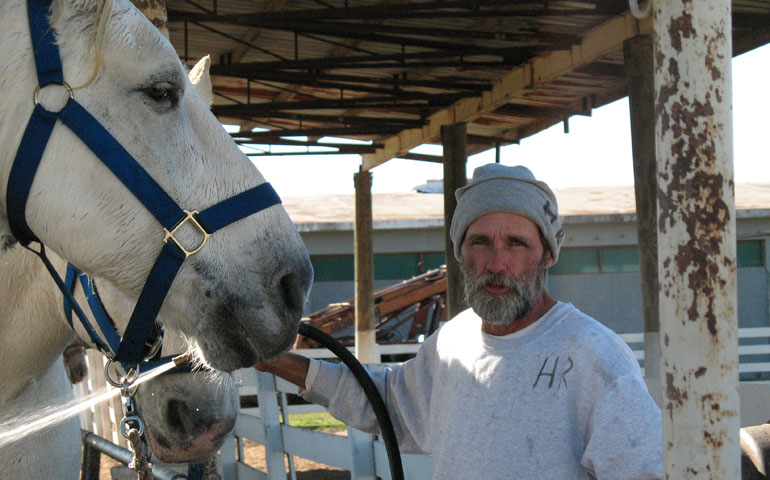
Inmate Howard Ray, 57, who is serving life for second-degree murder, works with Percheron, a breed of draft horse used at the penitentiary. He breaks and trains the horses and drives hitches. (Cheryl Wittenauer)
The bishop was coming for dinner, and the warden, a lifelong Protestant with a steep learning curve about Catholicism, was on the phone with a diocesan employee and his wife, a Catholic convert, for advice on Catholic protocol.
Would it be all right, Warden Burl Cain wanted to know, to invite a reporter to his dinner with Baton Rouge Bishop Robert Muench and his penance service for Catholic inmates at Louisiana State Penitentiary at Angola, the maximum security prison Cain has tamed from one of the South's bloodiest to a model of peace?
Cain, a self-described "Bapticostal" Protestant who peppers his conversation with Scripture retrieved from memory, has infused religion as a means to morality, civility and personal redemption into the prison of 5,000 mostly violent offenders that he has run for 17 years.
The prison, a sprawling, 18,000-acre former plantation surrounded on three sides by the Mississippi River, is dotted with chapels and churches, and is home to an extension campus of New Orleans Baptist Theological Seminary, which graduates inmates of all religious traditions with associate and bachelor's degrees in Christian ministries. Some graduates are transferred to other Louisiana prisons as missionaries to evangelize their peers through Bible studies, worship services or prayer groups.
"We graduate ministers here," Cain said. "The Catholics go to seminary too. I thought that Baptist-educated Catholics could become deacons and do the sacraments. The bishop just laughs at me."
Muench visits Angola three times a year, as did his predecessor, Bishop Alfred Hughes, said Linda Fjeldsjo, who has coordinated the Baton Rouge diocese's prison ministry for more than 20 years. Muench celebrates Mass, hears confessions and visits each of the 80-plus men condemned to die for their crimes who await execution in solitary confinement on death row.
"We've always had a Catholic presence or a priest" at Angola, she said, "but it was limited. It has grown."
Whether Cain's Catholic wife has influenced him, or he is feeling the heat of a federal court settlement with the American Civil Liberties Union in Louisiana, or is seeing multiple factors align, ministry to Catholic inmates at Angola is increasing.
Half of Angola's prisoners -- about 2,500 -- are from southern, culturally Catholic Louisiana, and about 500 of them are practicing Catholics, Cain said. But he came to realize the Catholic inmates were "under-churched."
"We want to church the Catholics too," Cain said. "I care about the Catholic inmates because I'm supposed to."
In late June, a Catholic priest from the Biloxi, Miss., diocese began living and working as a full-time chaplain at Angola, its first full-time Catholic priest in eight years and the first to reside there in 18 years. Fr. Bernard "Bernie" Papania of Gulfport, Miss., a former Missionaries of Charity priest in Mexico, learned of the need at Angola and began the long process of leaving his order and getting permission from the Biloxi and Baton Rouge dioceses to serve Angola.
"It was time-consuming," Fjeldsjo said, "but worth the wait."
She believes Papania's presence will persuade some fallen-away Catholic inmates to return to the faith.
Last December, Angola's historic St. Augustine Church, which had deteriorated from years of disuse, reopened after a Cuban-American benefactor donated more than $150,000 to restore the church and equip it with broadcast capability. The church is now open to prison staff, visitors and inmates with security clearance.
Jorge Valdes, 56, a convicted former drug trafficker, said he has visited Angola regularly over the last decade, first as an invited evangelical preacher, later as a Catholic who challenges others in the faith to consider prison ministry.
Valdes, who said he developed a "zeal for souls" after his own fall from grace and turnaround, credits his renewed interest in Catholicism to the Legionaries of Christ, a religious order that has come under Vatican scrutiny for revelations about its late founder, Marcial Maciel Degollado, and sexual abuse allegations.
Muench rebuffed Valdes' attempts to get a Legionary priest assigned to Angola.
Valdes said the Legionaries of Christ should not be chastised for the sins of its founder and that it has had a positive impact on many.
"We are all sinners saved by grace," he said.
About two and a half years ago, Loyola University New Orleans' Institute for Ministry began offering an extension program at Angola for inmates who desire spiritual growth that can enhance their ministry.
Fjeldsjo had noticed that Catholic inmates who had completed diocesan religious formation were ready for the next step. Each of the 11 mostly Catholic participants has a ministry at Angola.
One of them, John Balfa, serving time for second-degree murder, said he made a choice in 1993 to return to his Catholic faith after he realized he didn't recognize the person he had become.
"I asked God to help me," he said, "and reflected on my life and upbringing."
Today, he ministers to other prisoners and coordinates visits to Angola by JustFaith groups and confirmation classes.
In July 2009, the state of Louisiana settled with the ACLU of Louisiana in a federal court case brought on behalf of a Catholic death row inmate who claimed he couldn't receive the sacrament of penance or listen to a televised Catholic Mass because of mostly Baptist services broadcast from a tier of televisions shared by inmates. Under the settlement, the prison agreed to televise the Mass, limit the audio of religious broadcasts to earphones, and provide for the Mass, the Eucharist and private confessions on death row.
Marjorie Esman, executive director of the Louisiana ACLU, said that Cain later told her that "you were right to sue me about that. We were wrong."
Esman said she and Cain disagree about the tone of religious proselytizing at Angola and the use, or overuse of solitary confinement. Yet "when it comes to recognizing that everybody has a right to earn a second chance, he's very progressive," she said. "He does believe in redemption and the ability of everyone to improve themselves."
Last year, she teamed up with Cain and Catholic bishops on a law that allows Louisiana's nonviolent, non-sex-offender prisoners to be eligible for parole after age 60.
[Journalist Cheryl Wittenauer is based in St. Louis.]
Stories in this series
Catholic outreach widens at Louisiana Prison by Cheryl Wittenauer
Hospice program eases the dying by Cheryl Wittenauer




